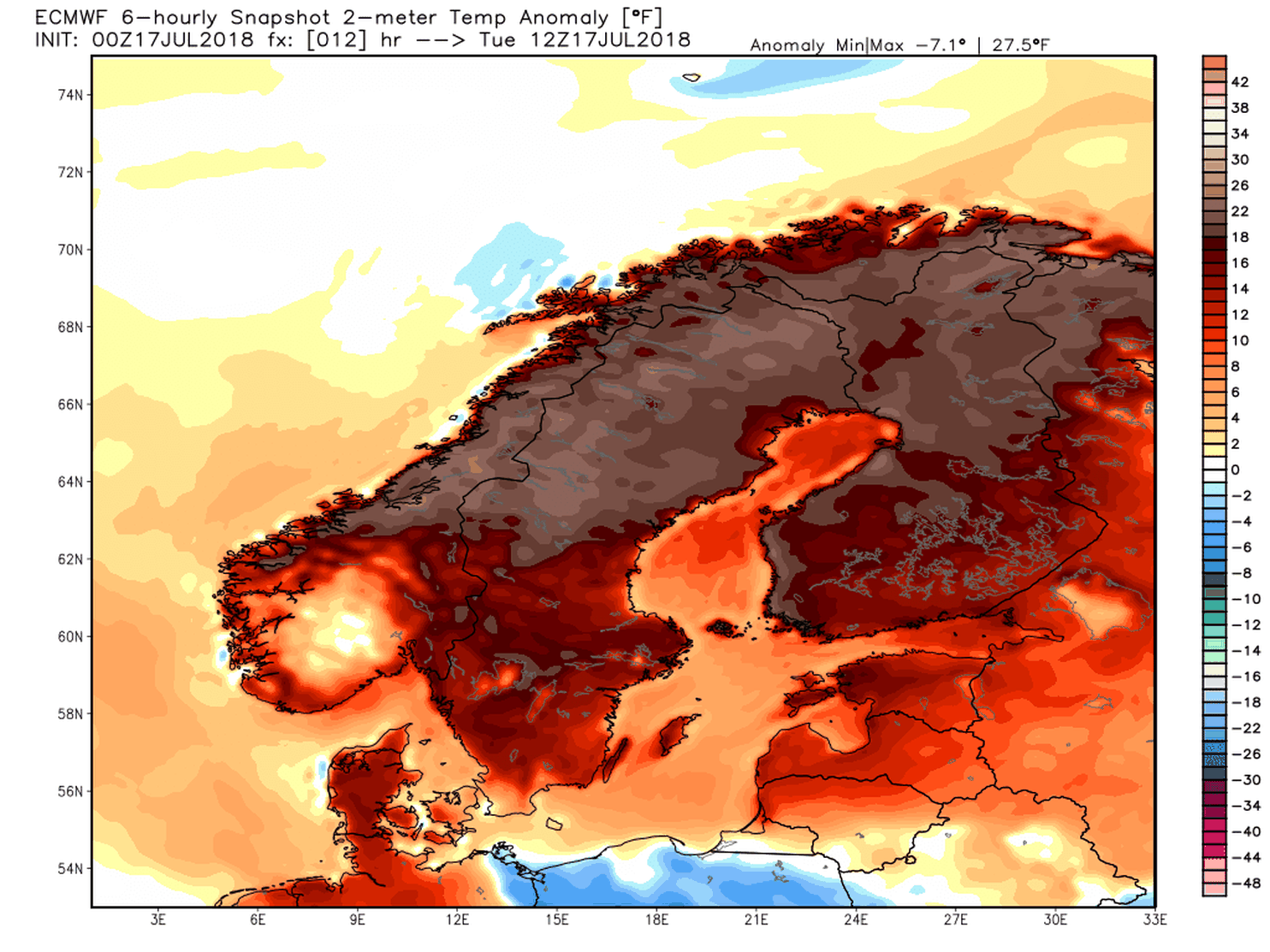


The scorching temperatures in Finland have officially reached record-breaking levels this year. The Finnish Meteorological Institute (FMI) announced that on Thursday, for the 66th time in 2021, temperatures surpassed 25 degrees Celsius, breaking the country's previous record of 65 hot days in 2002. The FMI, which has been tracking heat data since 1961, reported that the heat wave is expected to continue and temperatures are projected to hit 25 degrees in some areas on Friday and possibly Saturday. This comes after a report from the FMI in July, which revealed that temperatures in central and northern parts of Finland were unusually high.
Finland Breaks All-Time Record for Hot Days
Finland is experiencing record-breaking heat this summer, with temperatures soaring past 25 degrees Celsius for the 66th time this year. This exceeds the previous record of 65 hot days set in 2002.
According to the Finnish Meteorological Institute (FMI), the heat wave is expected to continue with temperatures remaining above 25 degrees in some areas on Friday and Saturday. The FMI, which has been monitoring heat data since 1961, says this is the longest-lasting heat wave recorded in Finland.
The heat is particularly unusual for northern parts of Finland, where temperatures are typically much cooler. In July, the FMI reported that temperatures in central and northern regions were abnormally high, reaching 25 degrees Celsius for the first time since 1975.
Causes of the Heat Wave
The heat wave in Finland is part of a larger pattern of extreme weather events occurring worldwide due to climate change. Rising global temperatures are causing changes in weather patterns, resulting in more frequent and intense heat waves, droughts, and other extreme events.
In Finland, the heat wave is also being influenced by a high-pressure system over Scandinavia, trapping warm air and preventing it from escaping.
Impact of the Heat Wave
The heat wave has had a significant impact on Finland. The hot weather has led to increased air pollution, as smog forms in the warm and stagnant air. The heat has also caused problems for infrastructure, with roads and railways buckling under the extreme temperatures.
The heat wave has also posed a health risk, especially for vulnerable populations such as the elderly, children, and those with underlying health conditions. The FMI has issued warnings for people to stay hydrated and avoid strenuous activity during the hottest hours of the day.
FAQs
Q: Why is Finland having a heat wave?
A: The heat wave is part of a larger pattern of extreme weather events occurring worldwide due to climate change and is also being influenced by a high-pressure system over Scandinavia.
Q: How long will the heat wave last?
A: The heat wave is expected to continue for several more days, with temperatures remaining above 25 degrees in some areas until Saturday.
Q: What is the impact of the heat wave?
A: The heat wave has led to increased air pollution, problems with infrastructure, and health risks for vulnerable populations.
Q: What precautions should people take?
A: People should stay hydrated, avoid strenuous activity during the hottest hours of the day, and check in on vulnerable neighbors and family members.
Q: What can be done to mitigate the effects of climate change and prevent future heat waves?
A: Mitigating the effects of climate change requires reducing greenhouse gas emissions through measures such as transitioning to renewable energy sources, conserving energy, and investing in research and development of low-carbon technologies.

The leaders of five European countries, including PM Keir Starmer and Ukrainian President Volodymyr Zelensky, gathered in London to address the ongoing war in Ukraine. Starmer declared that Russian President Vladimir Putin is not serious about pursuing peace, while Zelensky thanked the US for imposing new sanctions on Russia. Outside of the summit, Ukrainians shared their experiences and fears of living in a warzone.

India and the US are on the verge of finalizing a trade deal, with both sides making significant progress and ironing out most issues. Union Minister of Commerce and Industry, Piyush Goyal, clarified that India will not succumb to pressure and will only enter into a deal that is fair and beneficial for both countries. Furthermore, Goyal emphasized that India's approach is driven by a long-term vision, rather than momentary pressure or deadlines.

Delhi Police has arrested two ISIS operatives who planned to carry out blasts during Diwali celebrations in South Delhi. The suspects were reportedly radicalised online and had conducted recce of busy locations to inflict maximum casualties. Police believe the accused were in touch with foreign handlers and are looking into potential links to Pakistan's ISI. Investigations are ongoing to determine if the suspects have attempted to recruit others in Delhi and Bhopal.

In recognition of World Polio Day, Navi Mumbai joined the global effort to eradicate the paralyzing and vaccine-preventable disease by hosting an End Polio Now Laser Display. This initiative, organized by the Rotary Club of Navi Mumbai Joy of Giving, in collaboration with various organizations, aims to raise awareness and support for the cause. Despite significant progress, vigilance and continued commitment are still crucial to achieve a polio-free world.

The US and Australia have signed a deal to boost cooperation on rare earths and critical minerals, with the goal of reducing dependence on China. Australian Prime Minister Albanese has pledged to invest billions in crucial projects in the next six months as part of the agreement. Trump also emphasized the importance of the Aukus defense pact with Australia and the UK, stating that it serves as a deterrent against China. The deal is now moving forward quickly, with only minor clarifications left to be made.

Top US officials, including Vice President JD Vance and Secretary of State Marco Rubio, have spoken out against the Israeli parliament's vote to annex the already-occupied West Bank. Vance called the vote a "stupid political stunt" that could harm ongoing efforts towards a ceasefire and peace deal. Rubio warned that the move could jeopardize President Trump's plan to end the conflict. Despite the Knesset's approval, both officials reiterated that it is not the policy of the US to support annexation of the West Bank by Israel.

Pannir Selvam, a 28-year-old Malaysian man, received the death sentence in Singapore after being convicted of drug trafficking. Pannir's family, who remember him as a playful and talented musician, were shocked to hear of his arrest and have been fighting for his release ever since. With Singapore's strict laws against drug trafficking, Pannir's fate now lies in the hands of the court.

The FBI announced the arrest of Cindy Rodriguez Singh, one of its 'top 10 most wanted fugitives', from India in connection with the murder of her six-year-old son. She was charged with Unlawful Flight to Avoid Prosecution and Capital Murder. Patel commended the Indian and US agencies for their coordination in the case and noted that this is the fourth '10 Most Wanted' fugitive arrested in the past seven months. Singh's son had severe health and developmental issues and she allegedly fled to India to avoid prosecution, but justice knows no borders and the FBI never gives up on those who harm the innocent.

In a significant move, the descendants of Netaji Subhas Chandra Bose have urged Prime Minister Narendra Modi to institute a tradition of hoisting the National Flag at the Red Fort every year, to commemorate the establishment of the Azad Hind Government on October 21. The Azad Hind Government, formed under Netaji's leadership, played a key role in the fight for India's independence during World War II. With the 82nd anniversary of its establishment approaching, this request holds even more significance in honoring the sacrifices made by the Azad Hind Fauj.

Prime Minister Narendra Modi spent Diwali in an unconventional manner, celebrating the festival of lights with Indian Navy personnel onboard the aircraft carrier INS Vikrant. During his visit, Modi praised the INS Vikrant as a symbol of Aatmanirbhar Bharat and also witnessed a stunning air power demo by MiG 29K fighter jets taking off and landing on the short runway of the aircraft carrier. Modi was also deeply moved by a special cultural performance by the sailors, dedicated to the success of the Indian Armed Forces. He ended the evening by joining in the tradition of Bara Khana with the naval personnel. On the next day, Modi joined a yoga session on deck and watched a spectacular steampast of warships and flypast by aircraft.